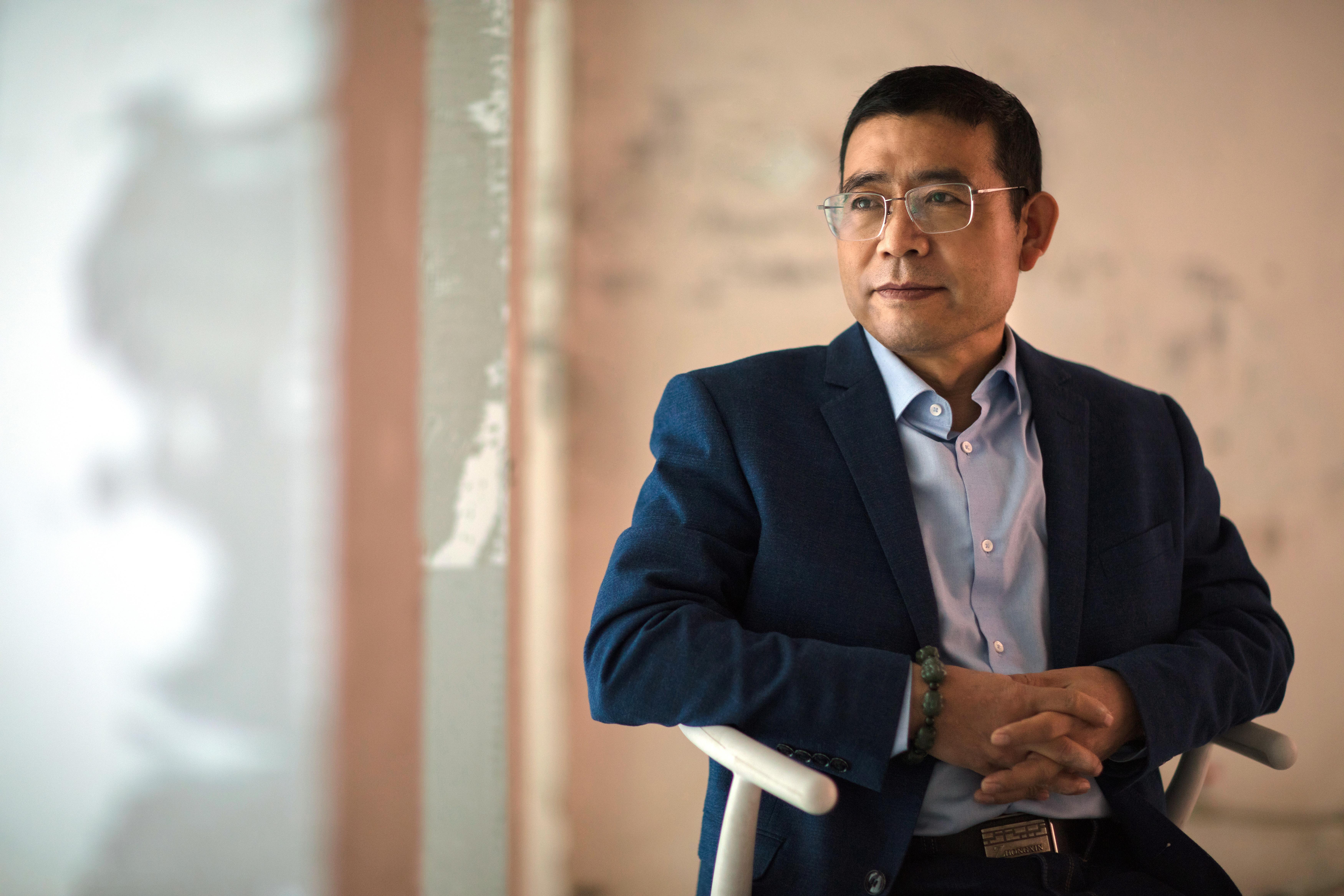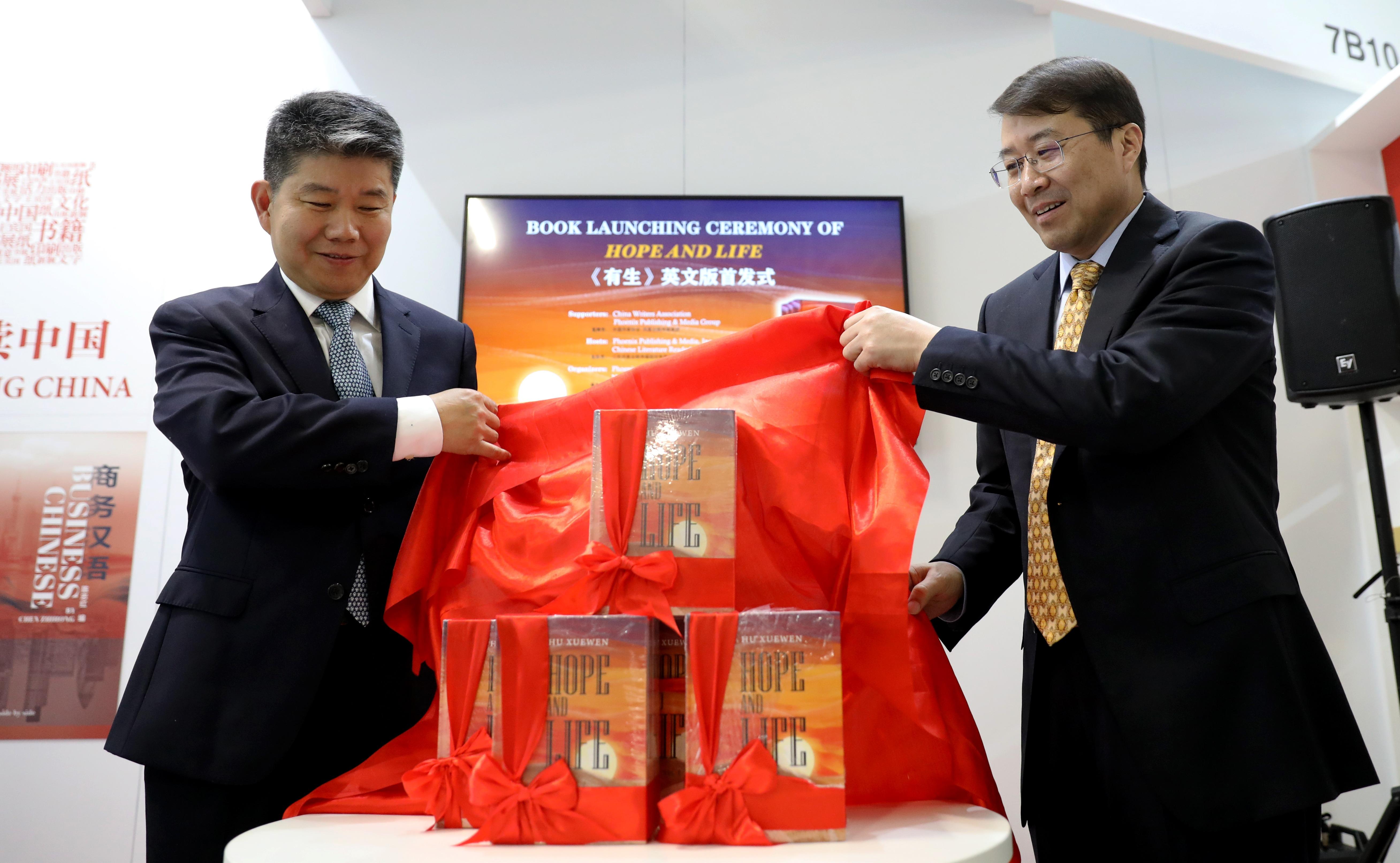Centered on a deified midwife, Hu Xuewen's unique story paints a picture of pastoral problems, proclivities and perseverance, Yang Yang reports.
 Writer Hu Xuewen has spent almost eight years working on the 938-page novel, Hope and Life, which explores the emotional and spiritual history of people in a rural area of China over the course of a century. (PHOTO PROVIDED TO CHINA DAILY)
Writer Hu Xuewen has spent almost eight years working on the 938-page novel, Hope and Life, which explores the emotional and spiritual history of people in a rural area of China over the course of a century. (PHOTO PROVIDED TO CHINA DAILY)
It is hard to summarize the novel You Sheng (Hope and Life) by Hu Xuewen, which extends for 938 pages and is narrated in a structure that the writer depicts as "umbrella-shaped".
Half of the 20 chapters are devoted to the recollection of the past by centenarian midwife Qiao Damei, or the "Great Grandmother", which constitutes the shaft of the "umbrella", and the remaining chapters recount the stories of five other characters, which form the canopy. The narration travels back and forth between the present and the past.
The novel provides a fresh spiritual temperament and attitude toward life, and the characters, especially the Great Grandmother, are very unique in Chinese literature.
Wang Binbin, professor of Chinese literature at Nanjing University
"It's my notion of good novels that they should not be easily summarized, but can provide space for different interpretations," Hu tells China Daily.
The 56-year-old writer is in London, where the three-volume English version of his novel was just launched at the London Book Fair. Since its publication in 2021, the book's copyright has been sold in eight languages, including English, German and French.
As the writer says, it is a novel about how to be born, live and overcome hardship. In 550,000 words, Hu paints a picture of people's lives in Songzhuang village, Zhangjiakou, in what is now Hebei province, from the end of the Qing Dynasty (1644-1911) to the present. The whole story was told by the Great Grandmother in one day and one night.
When the novel starts, Qiao, born in 1900, is lying in a bed in the village, a bitterly cold place beyond the Great Wall that used to be where emperors sent criminals into exile.
About 110 years old, she is half dead, confined to bed and losing the ability to speak or move. However, she is still clear-minded, with good hearing and a keen sense of smell.
Having delivered more than 12,000 babies throughout her career, midwife Qiao is famous for her exceptional skills and her pure and noble heart, which has won her the title of "a living Buddha". She has become a legend, a godlike person that villagers believe wields a superpower and has the ability to help them solve all kinds of problems. She is the "Great Grandmother", from whom villagers come to ask for blessings.
"Such a godlike character gives the novel great freedom in terms of narration," Hu says.
Born in a village in Guyuan county, Hebei, in 1967, Hu became a professional writer in 2002. His novella Cong Zhengwu Dao Huanghun (From Noon to Dusk) won the Lu Xun Literature Prize in 2014.
 Li Liyan (left), minister counselor for cultural affairs at the Chinese embassy in London, and Jin Guohua, deputy general manager of Phoenix Publishing and Media Group, unveil the English version of the book at the London Book Fair on Tuesday. (PHOTO PROVIDED TO CHINA DAILY)
Li Liyan (left), minister counselor for cultural affairs at the Chinese embassy in London, and Jin Guohua, deputy general manager of Phoenix Publishing and Media Group, unveil the English version of the book at the London Book Fair on Tuesday. (PHOTO PROVIDED TO CHINA DAILY)
About 10 years ago, Hu aspired to write an epic novel that would represent the rural areas he was familiar with, and which took place over the course of 100 years. It took him eight years to finish the novel. Before starting, he had to overcome several problems.
One was that there have already been lots of great novels that seem to have covered every aspect of rural life in China, so what fresh perspective could he provide?
Speaking at a seminar about the novel in 2021, Gao Yuanbao, professor of Chinese literature at Fudan University, asked: "What is still worth writing regarding China's rural areas?"
Gao said he saw in the novel various "infatuations" — the Great Grandmother with midwifery, Ruhua with her husband, Luo Bao with making bean curd, and so on. "Infatuation" becomes the center of their lives. He praised the novel's focus on the emotional lives of the individuals in the countryside.
According to her review of the book, what particularly drew the attention of literary critic Han Liang from Nanjing University, was how the villagers dispelled their depression and frustration.
For example, Mao Gen, a descendant of hunters, vents his frustrations by hunting wild animals. Luo Bao, an outstanding bean curd maker, needs to smell beans to calm himself down when life's pressures grow too great, while Yang Yifan, the head of the town, eats a lot of chilies.
"In this novel, I wanted to talk about how, after conquering poverty in the rural areas, to solve people's emotional and spiritual issues?" Hu says.
There are villagers who visit the Great Grandmother to complain.
"Complaining cannot really change the reality, while it also seems to be able to change everything. Expressing their sadness, anger, suffering and worries to the Great Grandmother will give people peace. Fighting hardships and complaining about them can also be an attitude toward life," literary critic Xie Youshun says.
Commenting on the novel, Wang Binbin, professor of Chinese literature at Nanjing University, says, "The novel provides a fresh spiritual temperament and attitude toward life, and the characters, especially the Great Grandmother, are very unique in Chinese literature."
For Hu, the Great Grandmother is not only a witness of history, but an individual whose destiny had been profoundly influenced by historical changes. In the character, he injected a perseverant spirit that he observed in people who live in the harsh environment of Zhangjiakou.
"The deaths of her three husbands and nine children are terrible blows. For a while, she wants to commit suicide, but chooses to live on to help women give birth. That's how she sees life and death," Hu says.
The Great Grandmother, who has suffered various miseries throughout her life, and has witnessed many births and deaths, becomes especially tough, wise, kind and tolerant. She is a spiritual idol for many people.
Wang says that the writer tries to look for modern spiritual resources, a foundation for modern life, from traditional China.
Another problem that Hu faced before starting the novel was that of characterization. He needed a protagonist from the countryside whose profession involves traveling around and see a broader world, to provide enough space to tell the stories of different people.
He thought of midwives, who traveled around serving people from all walks of life and classes, and who would witness the birth of new lives and sometime deaths of babies and mothers.
"Midwifery is an ancient profession. Even in the 1980s, women in rural areas were still being assisted by traditional midwives to deliver babies. I saw, several times, how they worked in the 1970s, because all my younger brothers and sisters were born with their help," Hu says.
The third problem that Hu needed to solve was to find a proper structure around which to weave the stories from the past and present.
Han compares the novel's structure to a cobweb woven around the Great Grandmother.
"Such a structure offers the narrating voice the freedom to travel between the past and present, the real and fictional, and the eternal and transitional, without appearing loose," she writes.
"Other critics said it's an open structure, but for me, it's an umbrella," Hu says.
"Whichever it is, I'm just happy that it provides a space for people to interpret and discuss."
Contact the writer at yangyangs@chinadaily.com.cn



